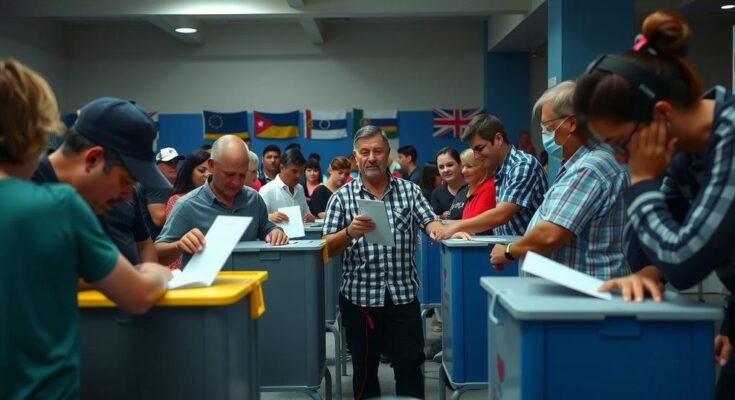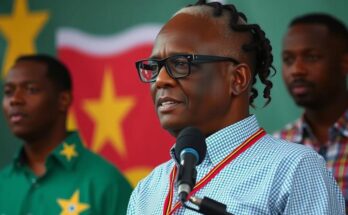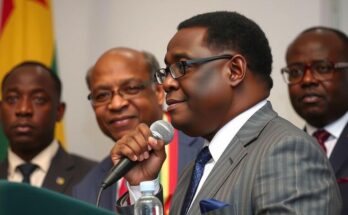Uruguay is holding a critical presidential run-off election with former President José Mujica’s leftist coalition facing off against Álvaro Delgado’s right-wing faction. Polls indicate a highly competitive race, with voter turnout crucial for both candidates as they hope to sway undecided voters and those who abstained from previous rounds. The election occurs amidst a backdrop of stable yet scrutinized governance, making this contest pivotal for the nation’s political future.
Voting is currently underway in Uruguay’s decisive presidential run-off election, with a tight contest emerging between the leftist coalition, Frente Amplio, led by the acclaimed former President José “Pepe” Mujica, and the right-wing candidate Álvaro Delgado of the National Party. The election follows five years of governance by the conservative coalition under President Luis Lacalle Pou. Polling stations opened at 8:00 AM local time and are set to close at 7:30 PM, with initial results expected shortly after.
In this election, with approximately 3.4 million citizens eligible to cast their votes, the electorate faces a choice between Yamandu Orsi representing the Broad Front, who garnered 43.9 percent of the earlier votes, and Álvaro Delgado, who received 26.8 percent but is supported by the conservative Colorado Party. Recent opinion polls indicate an extremely close race, possibly with fewer than 25,000 votes distinguishing the candidates.
Despite the tense global political climate, Uruguay has exhibited a semblance of political stability, with less intense polarization between parties compared to neighboring countries like Argentina and Brazil. President Lacalle Pou has maintained a solid approval rating amidst rising employment rates, although his administration has faced scrutiny concerning crime rates.
Yamandu Orsi’s campaign has emphasized a modern approach to leftist policies, projecting continuity rather than drastic changes. Conversely, Álvaro Delgado contends that the voters should “re-elect a good government,” invoking the successful policies of the current administration, as he cannot seek re-election. Notably, neither political alliance holds a majority within the lower house, rendering this election pivotal for future governance.
Orsi’s Broad Front has secured a Senate majority with 16 out of 30 seats, positioning him favorably for leadership should he win. Both candidates are actively courting the approximately 8 percent of voters who supported smaller parties in the first round, as well as those who opted not to vote. An earlier televised debate appears to have had minimal impact on voter sentiment, leaving some voters uncertain about their preferences. One voter, Rosario Gusque, expressed ambivalence, stating, “I do not know who I am voting for, especially after seeing the debate.”
As the year concludes—marked by numerous pivotal elections globally—the outcome of this run-off could defy the international trend where incumbent parties often experience a decline in popular support amid economic challenges, such as inflation and high living costs. The results will not only reveal the political orientation of Uruguay but also whether it maintains a distinct trajectory compared to global patterns.
This article discusses the political climate surrounding the presidential run-off election in Uruguay, an event characterized by a close contest between leftist and right-wing political factions. The background is rooted in five years of conservative governance under President Lacalle Pou, with the return of the leftist coalition led by former President Pepe Mujica being a significant point of contention. The electoral context also highlights Uruguay’s comparatively stable political environment amid global polarization, where issues like crime and economic challenges influence voter sentiment significantly.
In summary, Uruguay’s presidential run-off election presents a crucial decision for voters as they choose between two distinct political paths. With a very close race anticipated, the outcome will likely demonstrate whether the voters lean towards the continuity offered by the conservative coalition or the renewed emphasis on leftist policies proposed by the Broad Front. The election stands as a reflective moment in a global context of political shifts and challenges facing incumbents.
Original Source: www.aljazeera.com



